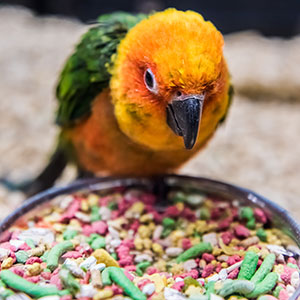
My First Bird
What Should I Feed My New Bird?
Proper nutrition for your pet bird is important to ensuring your feathered friend lives a long and healthy life. And just like fruits, vegetables and proteins are good for you, they are also a necessary part of your bird's diet.It's recommended that when you first get a bird, feed it the same food that he was fed before you got him and any changes in diet should be made gradually.
Since every bird has different dietary requirements, it's always best to talk with your avian vet to determine what type of diet to give your bird. To help give you an understanding of all the food options out there, we've broken them down to help make it easier to determine which option is best for your bird.
Food Options
- Seeds and Nuts
Pet birds can eat both germinated and ungerminated seeds but, with a few exceptions, seeds and nuts should not be a regular part of your pet bird's primary diet. They should be reserved as treats only.
Some of the most common seeds found in bird food seed mixes include safflower seeds, sunflower seeds, millet seed, canary seed, hemp seed and thistle seed.
Seeds are unhealthy when they are the main part of your bird's diet. Just like everything, moderation is key. Seeds are often high in carbohydrates and fats and deficient in vital nutrients such calcium, Vitamin D3 and lysine, one of the essential amino acids. A seed-only diet does not provide proper nutrition and must be supplemented with various fresh foods as well as vitamin and mineral supplements. Pet birds that are fed only seeds may become overweight and even develop illnesses, such as atherosclerosis and fatty liver disease.
But don't get us wrong, seeds and nuts used as a treat or for training are just fine. Seeds fulfill a pet bird's psychological need for "working" for its food since the bird must use its beak to crack open the seed. Seeds also provide some vitamins and trace elements.
Nuts are a great source of extra protein. Some birds, like macaws, need these extra protein sources. Types of nuts you can offer your bird are walnuts, almonds, hazelnuts and macadamia nuts. Feed plain nuts only, and avoid anything that is salted or honey-roasted.
Manufactured extruded or pelleted diets are often recommended by veterinarians, breeders and other avian professionals. A recent study has shown that generally the dietary needs for a pet bird can be met with a diet containing about 75 percent pellets and 25 percent carefully selected healthy low fat table foods.
A pellet usually consists of ground up grains and seeds, vitamins and minerals that are baked at a low heat and formed into shapes. Some pellets add coloring to appeal to your bird, while other pellets are natural colors. Some aviculturists do not recommend feeding dry pellets to Lories and other softbills.
One important note: Do not add vitamin supplements to pelleted meals unless your avian veterinarian tells you to. Too many vitamins can result in your bird developing hypervitaminosis, which can be very serious.
While you may not want to snack on some of your bird's pellets and seeds, there are a few bird-safe treats that you can both enjoy together. Many vegetables are packed full of vitamins, fiber, protein, calcium and other nutrients. Your bird will enjoy dark-leafy greens such as parsley, spinach, kale, collard greens, broccoli and Swiss chard. Bell peppers, sweet potatoes, green beans, carrots and squashes such as pumpkins, butternut and spaghetti are also great. Roasted squash seeds are also a tasty treat idea. Try mixing in legumes, beans, sprouts and whole grains such as quinoa, brown rice and oats. But save the dressing for your salad only… do not put any sort of dressing on your bird's vegetables.
Birds also love the taste and colorful look of most fruits, both dried and fresh. Fruits high in vitamin A such as mangoes, papayas, cantaloupe, persimmon, apricots and pomegranates are a great option. Most birds also enjoy pineapple, blueberries, strawberries, bananas and of course apples.
Since fruits and veggies are perishable, remove them from their food dish after a few hours so they don't spoil and make sure they are washed well before eating.
You can actually feed moderate amounts of animal-based proteins, such as well-cooked, unseasoned chicken, turkey or fish to your bird. Protein egg food or unseasoned scrambled eggs are another option and you can even crumble up and cook the shell with the egg. Ham, sausage, pepperoni and other processed meats should be avoided.
If you're a great cook in the kitchen, your bird may enjoy some home-cooked meals. Here's a tip, most birds LOVE pasta! Just be sure to check the list of Foods that are Toxic to Birds to make sure you don't accidentally give your feathered friend something you shouldn't.
It's also a good idea to avoid giving your bird foods that are high in salt, fat or preserved with sulfites. Fast food is also a no-no for birds due to the risk of bacterial contamination. And, while you may be a fan of cheese, your bird is not. Dairy products such as cheese, cream and butter should be avoided since birds are lactose intolerant.
Keep in mind that it isn't just ingredients you have to be careful of. Never use nonstick cookware or appliances when cooking anywhere that birds are present. In addition, never use the self-cleaning cycle of an oven when you aren't able to open the windows, or at any time when your bird can't be temporarily relocated. Fumes emitted from overheating and smoke from burned-on food can kill birds quickly.
When it comes to cooked foods, if you want to stay on the side of caution until you are up to speed on what's safe and what isn't, there are several types of soak-and-cook meals available to buy and these include all bird-friendly ingredients.
One thing to keep in mind with cooked meals, if you're reheating cooked bird food, make sure it is cooled off before handing the leftovers to your bird.
How Much Food Should I Feed?
The best advice here is to talk to your avian veterinarian about the specific portions to give your bird. Many veterinarians recommend a ¼ cup of pellets per day for small birds and a ½ cup of pellets per day for larger parrots. It is important to always follow your bird food package instructions as well.While fruits and veggies are great as a supplement, make sure your bird isn't filling up only on these items. If your bird doesn't eat its primary food (such as a pelleted or formulated food diet), back off on the amount of vegetables, fruits and other items they are eating.
Fruit Guidelines:
- ½ to 1 teaspoon for a small bird.
- 1 Tablespoon for larger birds.
Veggie Guidelines:
- Half of a spoonful to smaller birds.
- Small spoonful to larger birds.
Protein Source Guidelines:
- ½ Tablespoon for smaller birds.
- 1 ½ Tablespoons for larger birds.
Tricks for Getting a Picky Bird to Eat
If you find your feathered friend is a bit finicky when it comes to mealtime, try these tricks to get them to eat:- If your Budgie or other small bird refuses to eat fresh food in a dish, try instead attaching chunks of carrot, broccoli, corn on the cob or other fresh food to the cage bar.
- If your larger bird tosses out or ignores unwanted food, try stringing fruit and vegetables on kabob-style rod feeders.
- Believe it or not, looks are important to your bird. Make sure the food you are providing is full of a variety of colors, textures and shapes. Peas, carrots, corn, lima beans, apple slices, papaya, mango, sweet red or green peppers, broccoli, cooked beets and sweet potatoes offer eye appeal, taste and nutrition.
While food is an essential part of keeping your bird healthy, so is adequate water and sun. Make sure to provide your bird with clean, fresh water every day. It's a good idea to place your bird's water and food dishes on opposite ends of the cage. This ensures your bird will get some exercise between eating and drinking.
And always make sure your bird is exposed to natural daylight and/or full-spectrum lighting if they are indoors. This type of light is necessary for them to properly absorb nutrients.
So now that you know what to feed your new bird, the next question to ask yourself is How Do I Care for My New Bird?
Sources
American Veterinary Medical AssociationAssociation of Avian Veterinarians
Return to Bird Articles


